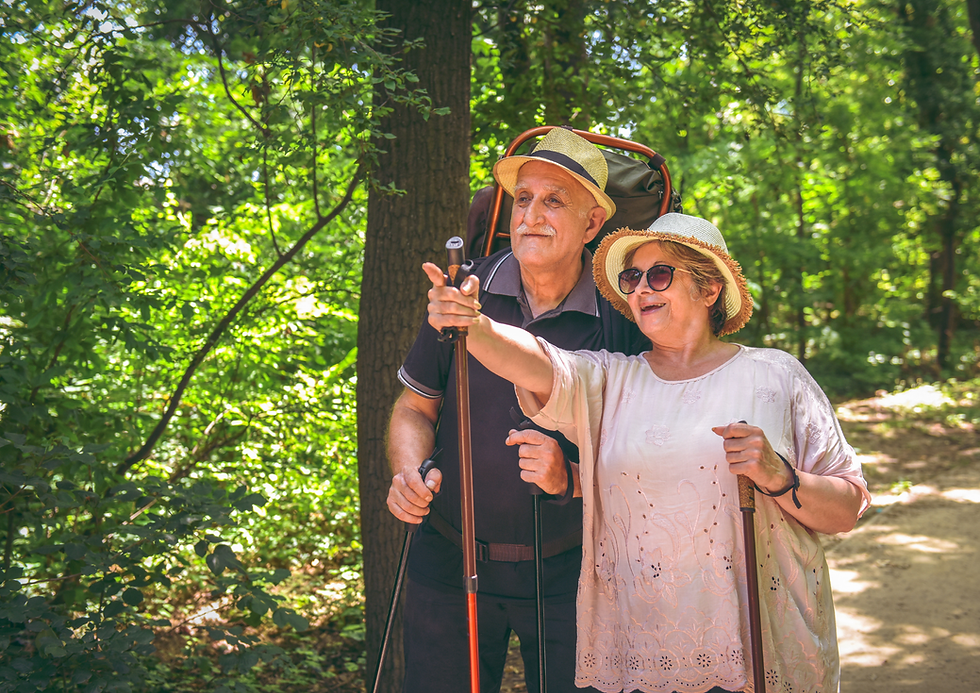Best Retirement Age for Retirees: Should You Retire at 65 or Wait Until 70?
- Jul 31, 2025
- 4 min read

The question of when to retire isn’t just a financial one it’s about lifestyle, wellness, purpose and personal goals. While many Americans target age 65 as the traditional milestone, others choose to delay retirement until 67 or even 70 to boost benefits or continue pursuing meaningful work. At Plantation Oaks of Ormond Beach, we’ve seen firsthand that retirement is not "one size fits all." Whether you’re planning ahead or reevaluating your timeline, this blog will help you make a confident, informed decision about the best retirement age for your lifestyle.

The Case for Retiring at 65
Pros:
- Access to Medicare (eligibility begins at age 65)
- Social Security benefits become available, though full retirement age depends on your birth year
- More time for travel, hobbies, friends, and family
- Easier to transition into a more relaxed lifestyle
Cons:
- You may receive a reduced Social Security benefit if you claim before full retirement age (66–67 for most people)
- Possible loss of purpose if your identity was tied to your career
- Ongoing out-of-pocket healthcare costs and insurance premiums
At Plantation Oaks, many early retirees enjoy vibrant, healthy lifestyles filled with activities, wellness programs and community connections that make early retirement more fulfilling.

The Case for Retiring at 70
While you can begin claiming Social Security as early as age 62, your monthly benefit increases the longer you delay up to age 70. Choosing to retire at 70 can provide significant financial advantages.
Pros:
- Higher Social Security checks you receive about 8% more per year after full retirement age until 70
- More years of income generation and savings accumulation
- Continued mental stimulation and purpose through work or volunteering
- Possibly healthier and more secure retirement years, both financially and emotionally
Cons:
- You’ll have less time in retirement to travel or pursue leisure
- Possible health issues could limit your lifestyle later in life
- Delay in spending quality time with family, especially grandchildren
According to the CDC, the average life expectancy in the U.S. in 2024 is about 79 years. Planning to retire at 70 gives you approximately a decade of retirement to enjoy if you're in good health.
Financial Considerations: Can You Afford to Retire Early?
A. Evaluate Your Retirement Budget
- Have you paid off major debts, like a mortgage or car loan?
- Can you comfortably cover healthcare, food, and leisure expenses?
- Do you have a reliable income stream (e.g., pension, Social Security, retirement accounts)?
Tip: Use tools like Fidelity’s Retirement Score or speak with a certified planner to model your financial readiness based on your chosen retirement age.
B. Understand the Impact on Social Security
- Taking Social Security at 62 results in permanently reduced benefits
- Waiting until full retirement age (66–67) ensures full benefit
- Delaying until 70 provides the maximum benefit

Consider your longevity, health, and family history when choosing when to start drawing Social Security.
Health & Wellness: Will You Be Able to Enjoy Retirement?
Your physical and mental health play a major role in retirement timing:
- Are you healthy enough to enjoy travel, hobbies, and social life?
- Would continued work provide structure and mental engagement?
- Could retiring earlier help reduce stress and boost your well-being?
At Plantation Oaks, retirees of all ages benefit from:
- Daily fitness classes
- Health screenings
- A low-stress, active environment that supports long-term wellness
Lifestyle Considerations: What Kind of Retirement Do You Want?
C. Social and Emotional Readiness
- Are you ready to replace work with new purpose, like volunteering or hobbies?
- Do you have friends, a partner, or family nearby to stay socially engaged?
- Are you looking to travel, move into a community, or settle down?
Retirement is not just about money it’s about how you want to spend your time.
Many residents at Plantation Oaks say they thrive after making the move earlier than expected thanks to the built-in social life and engaging community.
Why Plantation Oaks Is Ideal at Any Retirement Age
Whether you retire at 65, 67, or 70, Plantation Oaks supports your lifestyle goals:
- Independent living designed for low maintenance
- Social clubs, hobby groups, and volunteer opportunities
- Fitness and wellness programs tailored for seniors
- An engaged, friendly 55+ environment that fosters well-being
Plantation Oaks homes start affordably at around $239,900, with community fees that cover many services keeping life simple and affordable.
Transitioning to Retirement: Tips for Success
- Create a pre-retirement routine to prepare for more free time
- Meet with a financial advisor to map out income needs
- Explore options like part-time work, consulting, or passion projects
- Join a community with built-in support systems, like Plantation Oaks
You don’t need to retire all at once. Consider phased retirement, where you reduce work hours gradually.

There’s no single best retirement age for retirees. Whether you want to maximize Social Security, take control of your time, or pursue passions, the decision should align with your health, finances, and life goals. For some, retiring at 65 brings joy and freedom. For others, waiting until 70 provides peace of mind. No matter when you choose to retire, Plantation Oaks offers the lifestyle, security, and community to help you make the most of your golden years.




Comments